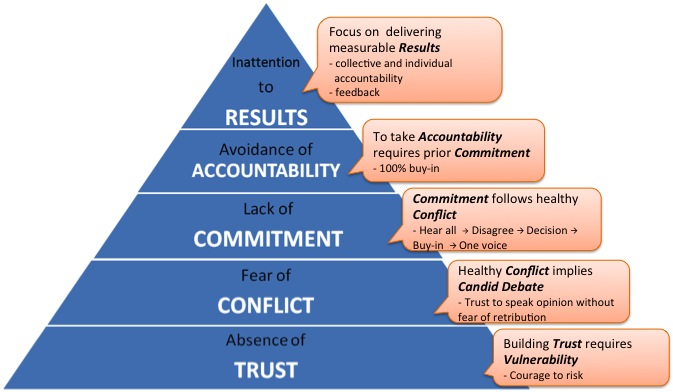Last week, my good friend and colleague Michael Chechile, Director General for Lester B. Pearson School Board sent out a tweet that asked Michael Fullan to summarize his day/ presentation/ approach/ strategy/ deep learning/ in one word to make it happen. It really should come as no surprise that Fullan’s one word was TRUST. One word, so simple yet so powerful for education or business organizations. James O’Toole suggests that trust:
- Is the most elusive and fragile aspect of leadership.
- Is the glue that binds people together in groups.
- Must be earned. It is hard to earn, easy to lose, and once lost, almost impossible to regain.
Trust is essential in fostering effective and authentic relationships both inside and outside of an organization. You cannot have a strong relationship without trust…period! In organizations where teamwork is crucial, trust must be alive and well. Patrick Lencioni in his book The Five Dysfunctions of Team lists absence of trust as the first dysfunction.

If there is an absence of trust, then fear of conflict, lack of commitment, avoidance of accountability and inattention to results prevails. From effective relationships to organizational change, trust is the key ingredient.
When I’m working with new or perspective administrators around the quality standard of “Fostering Effective Relationships” I always begin with trust. Just as literacy and numeracy are foundational for student learning, so too is trust to leadership. Knowing about the importance of trust is not enough, it must be put into practice. But how?
Stephen M. R. Covey, author of The Speed of Trust, articulates 13 behaviors of high trust in this short video. And while I would never disagree with his list, I would also place the characteristic of vulnerability as a pre-requisite for building high levels of trust. Old style leadership training would categorize this trait as a major weakness. Vulnerability however, doesn’t naturally imply weakness or losing your thick skin (believe me, leaders still need a thick skin) rather it means not losing your compassionate heart. Being vulnerable as a leader requires great confidence in oneself and a willingness to put yourself out there. It is more about strength of character than authority of position. Trust and vulnerability work hand in hand and in any successful organization, great leaders demonstrate both.
